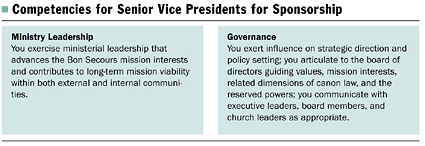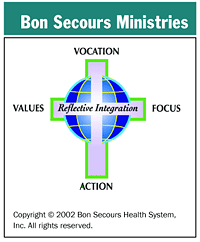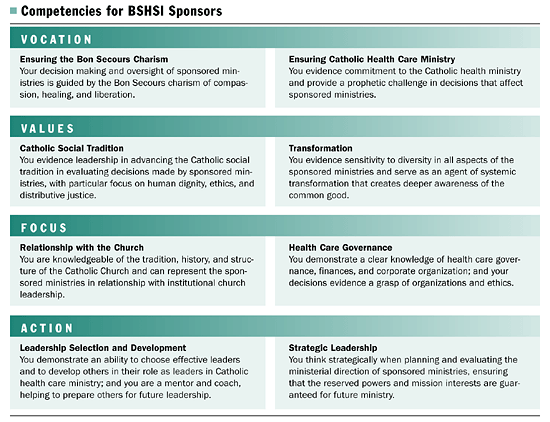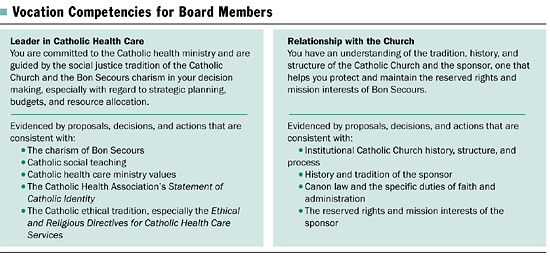BY: SR. PATRICIA A. ECK, CBS, and THOMAS H. MORRIS, PhD
Sr. Patricia is chairperson, board of directors, and Dr. Morris is vice president, sponsorship, Bon Secours Health System, Marriottsville, MD.
Editor's note: This is the second part of a two-part article. Part one, "Continuing Bon Secours's Mission," appeared in the January-February 2005 issue of Health Progress (pp. 48-50).
A Maryland-Based System Prepares Itself for Public Juridic Person Status
Support for the development of leaders and staff members in Catholic health care is vital for the ministry's future. Bon Secours Health System, Inc. (BSHSI), Marriottsville, MD, places a high priority on such development. Indeed, BSHSI's commitment is reflected in various strategic documents, including its Sponsorship Policies, Strategic Quality Plan, and Human Resources Philosophy, to name only a few.
As we noted in our previous article, BSHSI currently is sponsored by the Sisters of Bon Secours USA, Marriottsville, MD. The sisters have petitioned the Vatican's Congregation for Institutes of Consecrated Life and Societies of Apostolic Life to designate a public juridic person, called "Bon Secours Ministries," as BSHSI's new sponsor. That decision is pending. In the meantime, the sisters and BSHSI's leaders have for a number of years been focusing on leadership development as a significant part of ensuring the ministry's future.
In 2001 an interdisciplinary team from BSHSI, working with consultants from the Hay Group, Philadelphia, created an educational framework it called the "Continual Development System" (CDS). The CDS provides BSHSI with an operating philosophy with which to coordinate the development of both leaders and "co-workers," BSHSI's term for employees. The CDS model benefits BSHSI in three ways:
- It prepares leaders and co-workers to continue the mission of the Sisters of Bon Secours.
- It develops BSHSI spiritually as an organization by developing its leaders and co-workers.
- It enhances the organization's practical performance and capabilities.
Within this general context, a team composed of BSHSI's senior vice presidents of sponsorship and its Department of Sponsorship and Mission—hereafter, the "sponsorship group"—also developed specific competencies for:
- The system's sponsors, Bon Secours Ministries
- The system's board of directors
- The system's senior vice presidents of sponsorship
The CDS Model
The origins of BSHSI's CDS model can be traced to 1994, when the Catholic Health Association (CHA) engaged Hay/McBer, Boston, a Hay Group subsidiary, to conduct research into the competencies required for leadership in the Catholic health ministry (see John Larrere and David McClelland, PhD, "Leadership for the Catholic Healing Ministry," Health Progress, June 1994, pp. 28-33). In 1999, CHA and Hay Acquisition Company I, Philadelphia, another Hay Group subsidiary, brought these competencies together in what they called a Mission-Centered Leadership Model (see Fr. Michael D. Place, STD, "CHA Moves Forward on Leadership Development, BBA," Health Progress, November-December 1999, pp. 10-11, 16). BSHSI participated in the creation of the Mission-Centered Leadership Model.
In 2001-2002, with assistance from Hay Group personnel, BSHSI adapted the Mission-Centered Leadership Model to meet its own needs. The result was the CDS model. The CDS model differs from the Mission-Centered Leadership Model primarily in that it is intended for the competency development of all BSHSI employees—co-workers as well as executives—not just the top leadership alone.
Like the Mission-Centered Leadership Model, the CDS model involves four competency "clusters": Action, Focus, Values, and Vocation (see graphic).*
*The description of the CDS model has been adapted from BSHSI's Leader Handbook.
- The Action cluster emphasizes achieving real-world results.
- The Focus cluster emphasizes effective performance that is guided by a clear and accurate focus on the operational realities.
- The Values cluster balances operational realities with the transforming possibilities of the ministry's faith-based values, as evidenced by a commitment to the Catholic health ministry's and BSHSI's values and operating principles.
- The Vocation cluster emphasizes BSHSI's particular and unique call to respond to those in need, especially those who are poor and dying.
Aligned with that sense of vocation or call is a sense of responsibility, on the part of all associated with the organization, to act with integrity and to further the organization's mission: healing, compassion, and liberation.
Reflective integration provides the balancing of the four clusters that is essential for the development of both the organization and its people.
The Sponsorship Competencies
The Sisters of Bon Secours USA put a high priority on developing a set of
competencies for those who will serve as the system's canonical sponsors,
the members of Bon Secours Ministries. Using the CDS model, the sponsorship
group developed a set of sponsorship competencies reflecting the four clusters
(see Box). Each member of Bon Secours Ministries is expected
to demonstrate some level of proficiency in each competency. Bon Secours Ministries
as a whole should demonstrate a high level of expertise in the full competency
set.
In developing competencies for Bon Secours Ministries, the sponsorship group came to see the importance of developing similar sponsorship competencies for BSHSI's board members. As partners in governance, board members share in the sponsorship responsibility. Recognizing that other board competencies reflect the Values, Focus, and Action clusters of the CDS model, the sponsorship group developed a Vocation cluster for the board, thereby incorporating sponsorship-related competencies (see Box). In order to clarify the sponsorship competencies for the BSHSI board, descriptions of what the competencies "look like" were provided for each competency.
BSHSI's senior vice presidents of sponsorship support management in integrating the mission within major operational decisions, thereby reflecting the interests and concerns of the canonical sponsors. The senior vice presidents' own development is focused through an executive leadership competency set shared by all BSHSI executives. The CDS model also requires job-specific competencies to be developed in a way that complements the leadership-level competency set. Since the senior vice presidents and the mission staff at BSHSI's corporate office were leading the effort to develop the competencies for Bon Secours Ministries and the BSHSI board, they also critically reflected on the uniqueness of their role and developed appropriate competencies to reflect this unique role (see Box).

Future Impact
The development of sponsorship competency sets for BSHSI's various
key leadership roles is relatively new for the system. However, the sets already
have had an impact on how BSHSI plans for the future of its ministry.
Bon Secours Ministries has joined in a partnership-formation process with other sponsors in Catholic health care to prepare potential persons to serve as canonical sponsors, and this process is based on the sponsorship set. BSHSI's board has, over the course of a year, engaged in an extended reflection process (based on the sponsorship competencies) concerning its decisions, trying to discern how those decisions reflect the board's awareness of its role as a ministry leader. The competency set for senior vice presidents has helped them clarify sponsors' specific expectations concerning the interrelationship of the system's mission and its operations.
The development of the sponsorship competency sets has deepened BSHSI's leaders' awareness of the importance of sharing responsibility for the ongoing service of Catholic health care. Through the sponsorship competencies, BSHSI's sponsors and leaders have given expression to an abiding awareness of the necessity of ensuring a future in which "good help to those in need" continues to be provided.

 xx
xx
